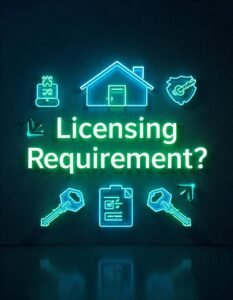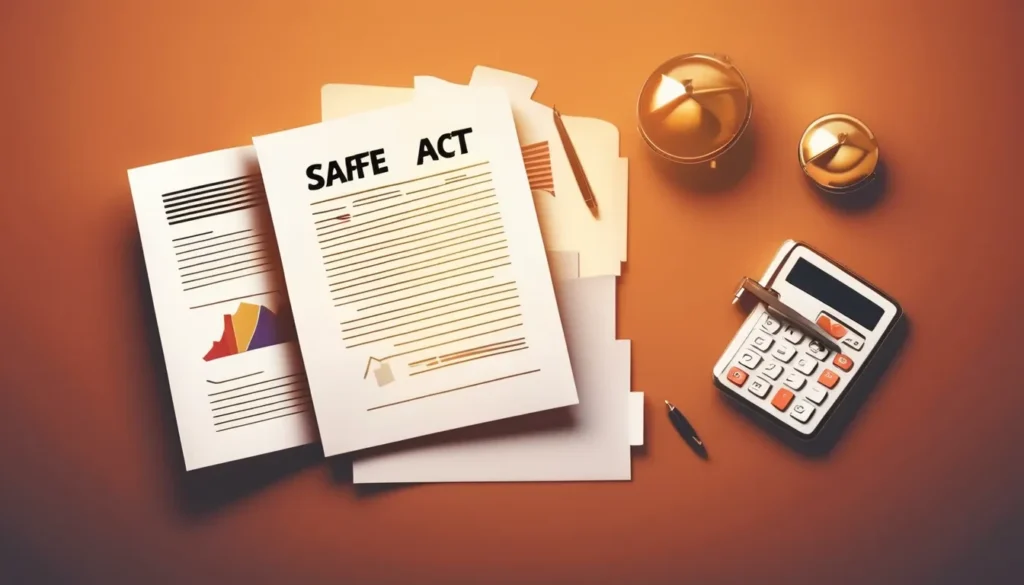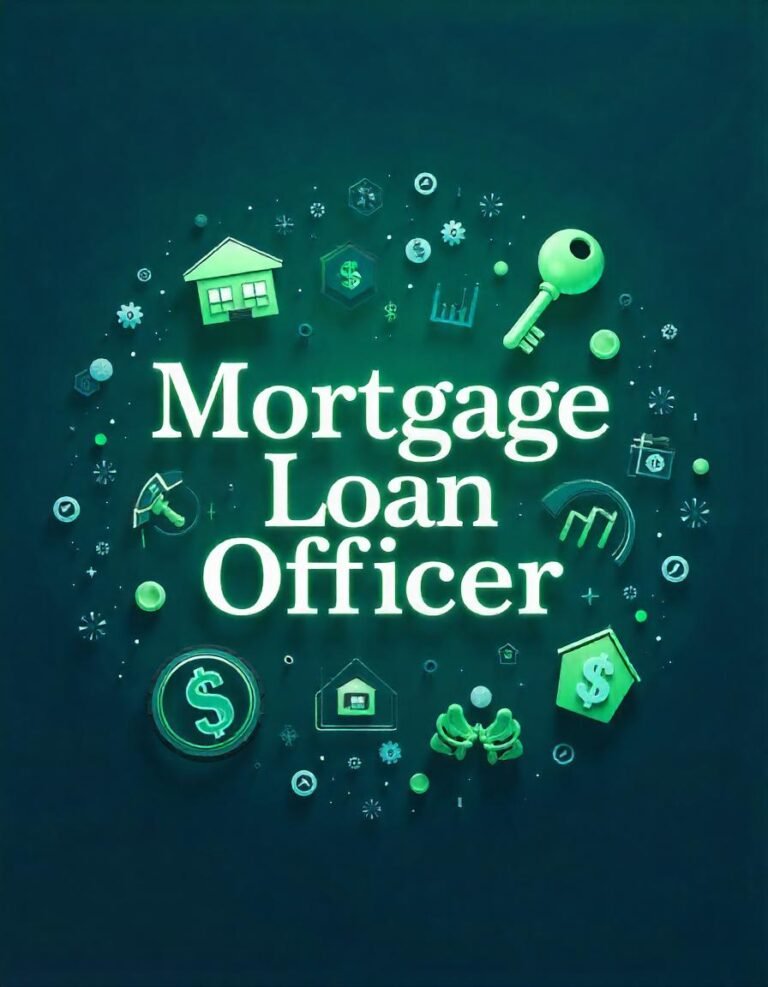How to Become a Mortgage Loan Officer:
To become a Mortgage Loan Officer (MLO), you need to follow specific steps. Start by completing at least 20 hours of training in mortgage lending. This includes learning about laws, ethics, and the lending process. Next, pass the SAFE exam, which tests your knowledge of mortgage laws and practices. After this, you must keep up with continuing education to stay updated on industry rules and trends.
What is a Mortgage Loan Officer (MLO)?
A Mortgage Loan Officer (MLO) is a professional who helps people secure loans for buying homes. They work with a lender, credit union, or mortgage broker to guide clients through the process. Their role includes reviewing the borrower’s credit report and financial history to match them with suitable mortgage options. MLOs play an essential role in making the home-buying process smoother for borrowers.
What Does a Mortgage Loan Originator (MLO) Do?
A Mortgage Loan Originator (MLO) works to connect borrowers with the right mortgage lending options. They assess the borrower’s credit report to determine eligibility and explain loan terms clearly. MLOs collaborate with lenders, mortgage brokers, and credit unions to find the best deals for their clients. They also ensure all paperwork is accurate and guide borrowers through every step of the mortgage application process.
Licensing Requirements to Become a Mortgage Loan Officer

- Complete pre-licensing education as required by state or federal laws.
- Pass the national exam to demonstrate knowledge of mortgage laws and practices.
- Submit fingerprints for a background check to ensure compliance with ethical standards.
- Obtain a license to legally work as a Mortgage Loan Officer (MLO).
- Complete continuing education regularly to keep the license active and stay updated on industry regulations.
NMLS and the Mortgage License
The Nationwide Multistate Licensing System (NMLS) is a platform used to manage MLO licensing. You must register with NMLS to apply for a mortgage license. This system tracks licensing information and ensures compliance with federal and state regulations. NMLS also helps organize education courses and exam schedules, making it a vital tool for anyone pursuing a career in mortgage lending.
State-Specific Requirements for MLOs
Each state has its own requirements for Mortgage Loan Officers. These requirements may include extra coursework, background checks, and state-specific exams. Some states require additional training on local laws and practices. Checking your state’s specific guidelines is crucial to ensure you meet all necessary qualifications. Adhering to these rules helps MLOs serve clients effectively within their region.
Steps to Become a Licensed Mortgage Loan Officer
Step 1: Complete Required Pre-Licensing Education
To become a mortgage loan originator, you must complete required education courses. These courses cover topics like mortgage origination, loan options, and ethics. They are designed to
help you understand the basics of mortgage lending and meet the standards set by the Mortgage Licensing Act. Completing this step is essential to become a loan officer and ensures you are prepared for the next steps.
Step 2: Pass the NMLS Exam
After finishing your pre-licensing education, you need to pass the NMLS exam. This test evaluates your knowledge of mortgage origination, loan options, and federal laws, including the Mortgage Licensing Act. The exam ensures you are ready to become a loan professional and follow fair enforcement practices. Passing the test is a crucial step in achieving your goal of becoming a mortgage loan originator.
Step 3: Complete a Background Check and Fingerprint Process
To meet the standards of fair enforcement, you must undergo a criminal background check and fingerprint process. This ensures you comply with the ethical guidelines required to become a mortgage loan originator. The background check is part of the Mortgage Licensing Act and confirms your eligibility to work in the industry. Completing this step builds trust with clients and lenders alike.
SAFE Act for Mortgage Loan Officers

The SAFE Act sets the standards for Mortgage Loan Officers to ensure professionalism and compliance in the mortgage industry. It requires mortgage loan originators to complete 20 hours of pre-licensing education and pass the SAFE exam. This act protects consumers by ensuring that state-licensed loan originators follow ethical practices and understand the loan process fully. Compliance with the SAFE Act is a crucial part of becoming a trusted MLO.
What is the SAFE Act and How Does It Impact MLOs?
The SAFE Act, or Secure and Fair Enforcement Act, requires mortgage loan officers to meet specific licensing standards. To comply, MLOs must pass a national exam, take the SAFE test, and undergo continuing education. This act also ensures uniformity across state-licensed loan originators and helps them become familiar with different loan options. The SAFE Act directly impacts the professionalism and trustworthiness of the mortgage industry.
Ensuring Compliance with the SAFE Act
To ensure compliance with the SAFE Act, MLOs must complete 20 hours of pre-licensing education and pass the uniform state test. They also need to follow ethical standards and keep up with industry regulations. Staying updated on laws and taking regular training are essential steps. This process helps real estate agents, clients, and lenders trust MLOs throughout the loan process.
How to Get Licensed as a Mortgage Loan Originator (MLO)
Getting your mortgage license as an MLO requires specific steps. You must complete 20 hours of pre-licensing education, take the SAFE exam, and pass a national test. Additionally, you need to undergo a background check and become familiar with different loan options. These steps are necessary to meet the requirements of the SAFE Act and help you guide clients effectively through the loan process.
Why You Should Get Licensed to Become a Mortgage Loan Officer
Getting licensed to become a mortgage loan officer opens up opportunities to help clients secure funded loans. A license ensures you are qualified to assist clients with different loan options and follow the legal requirements of the SAFE Act. Licensing not only builds your credibility but also allows you to work closely with real estate agents, guiding borrowers through the steps of buying a home.
Final Steps to Becoming a Licensed Mortgage Loan Officer
The final steps to becoming a licensed MLO include passing the SAFE test, completing a background check, and waiting 180 days if you need to retake the exam. After meeting these requirements, you can assist clients with funded loans and guide them through the loan process. These steps ensure that you meet industry standards and are prepared to work as a state-licensed loan originator.
Interested in Becoming a Mortgage Loan Officer? Here’s What You Need to Know
If you’re looking to become a mortgage loan officer, there are essential steps you need to take. Start with 20 hours of pre-licensing education, take the SAFE exam, and pass a national test. You’ll also learn about the loan process and different loan options. This career offers great opportunities to work with real estate agents and help borrowers achieve their dream of homeownership.
How to Start Your Journey to Becoming a Licensed MLO
Starting your journey to become a licensed MLO involves following a structured guide to becoming a mortgage loan officer. Begin with 20 hours of pre-licensing education to understand the loan process. Next, take the SAFE exam and pass a national test. These steps will prepare you to navigate the industry and offer clients the best loan options. Patience and dedication are key to succeeding in this field.
Why You Should Consider Becoming a Mortgage Loan Officer
Becoming a mortgage loan officer is a rewarding career choice, especially if you have sales experience. You’ll guide clients through the loan process and help them secure funded loans. This role allows you to work with real estate agents and assist borrowers with different loan options. If you enjoy helping people and have an interest in finance, getting your mortgage license could be the perfect career path for you.
FAQs:
What Are the Key Licensing Requirements for MLOs?
MLOs must take 20 hours of pre-licensing education, pass national and state-specific tests, and meet Secure Act requirements. Access approved courses to prepare for these exams.
How Long Does It Take to Become a Licensed Loan Officer?
Becoming an MLO takes a few weeks to complete education and exams. Additional requirements for banks or credit unions may extend the process
What Background Checks Are Required for MLOs?
MLOs undergo a criminal background check, fingerprinting, and financial verification. Check specific state requirements on the NMLS website.
